Nature exposure offers numerous benefits, including improved cardiovascular health, enhanced immune function, elevated mood, and stronger relationships. By recognizing these scientifically-proven advantages, we can prioritize outdoor experiences for all generations.
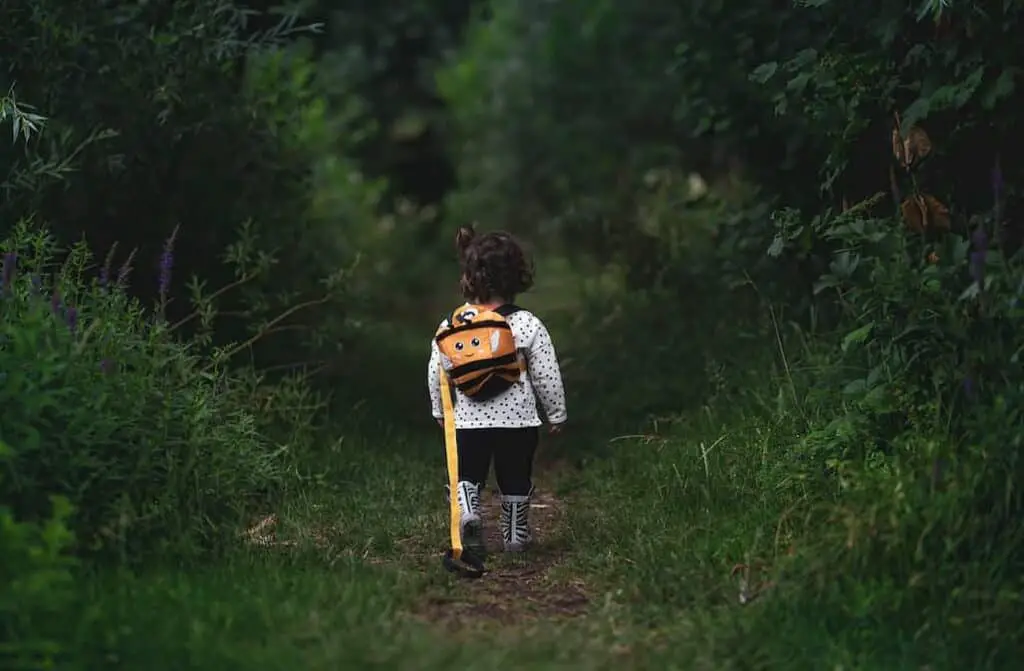
As someone who spends regular time outdoors, I can’t emphasize the incredible benefits of being in nature enough. There’s something magical about feeling the sun on your skin, breathing in the fresh air, and witnessing the beauty of our natural world. I’ve experienced firsthand how spending time in nature can transform one’s physical, mental, and emotional well-being, and I’m excited to share my insights and experiences with you.
In this friendly guide, we’ll delve into the numerous benefits of spending time outside, backed by scientific research and scholarly sources. I hope that after reading this, you’ll feel inspired to embrace the great outdoors and create unforgettable memories with your loved ones. So, let’s start on this journey to discover the wonders of nature!
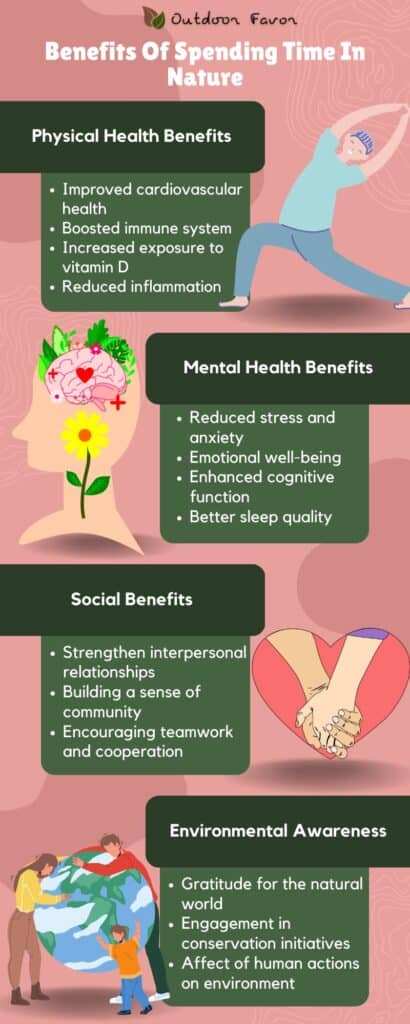
Physical Health Benefits
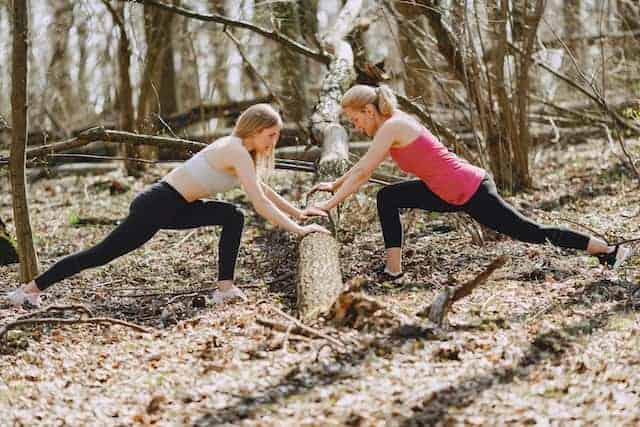
a. Improved cardiovascular health
Spending time in nature often involves physical activity, which can help improve cardiovascular health. A study published in the Journal of Environmental Research found that exposure to green spaces, mainly through physical activities such as walking or cycling, was associated with reduced risk of cardiovascular disease, obesity, and type 2 diabetes. The natural surroundings provide a pleasant environment that encourages people to engage in physical activities, supporting heart health.
b. Boosted immune system
Being outdoors exposes you to fresh air and natural elements, which can help boost your immune system. Research conducted by Japanese scientists on “forest bathing” (immersing oneself in nature) discovered that spending time in natural environments could increase the activity of natural killer (NK) cells, a type of white blood cell that plays a critical role in immune function. These results suggest that nature exposure may enhance immune function and illness resistance.
c. Increased exposure to vitamin D
Sunlight provides vitamin D for healthy bones, teeth, and immune system function. A study published in the Journal of Clinical Endocrinology & Metabolism found that increased sun exposure positively correlates with higher vitamin D levels, which can help prevent bone-related issues such as osteoporosis and rickets. Engaging in outdoor activities ensures regular exposure to sunlight, supporting overall health.
d. Enhanced weight management and fitness
Outdoor activities often involve physical exertion, helping you maintain a healthy weight and improve overall wellness. A study in the American Chemical Society’s Journal found that green exercise, or physical activity in natural environments, can lead to more significant weight loss and improved mental well-being compared to indoor training. Activities like hiking, cycling, and swimming in nature can contribute to weight management and fitness.
e. Reduced inflammation
Spending time in nature has been shown to reduce inflammation, a contributing factor to various health issues. A study published in the Proceedings of the National Academy of Sciences found that participants who spent time in nature experienced reduced inflammation markers compared to those in urban settings. This reduction may be due to lower stress levels (caused by self-reported rumination) and exposure to health-promoting phytoncides found in natural environments.
Mental Health Benefits
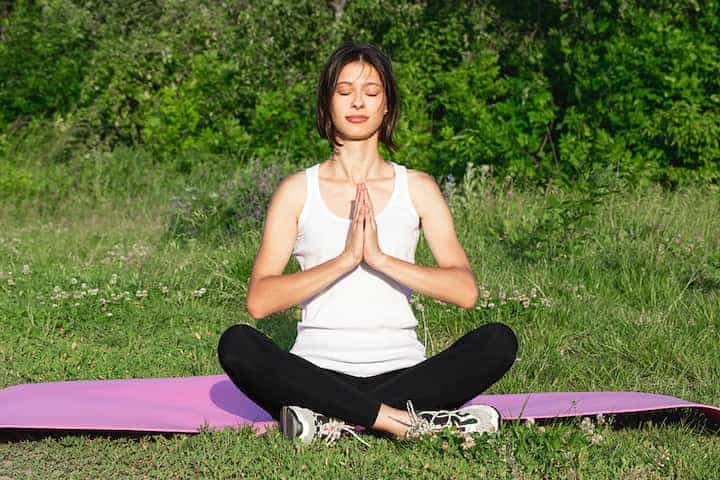
a. Reduced stress and anxiety
A study published in the International Journal of Environmental Research and Public Health found that exposure to natural environments significantly reduces stress and anxiety. The calming sounds and sights of nature, combined with physical activity, stimulate the production of feel-good hormones, such as serotonin and endorphins, which help alleviate stress and anxiety symptoms.
b. Improved mood and emotional well-being
Spending time in nature can enhance your mood and emotional well-being. A study in the Journal of Environmental Psychology found that being in natural settings increased positive emotions, vitality, and overall life satisfaction. These improvements were attributed to the stress-reducing effects of nature and the mental restoration it provides.
c. Enhanced cognitive function and creativity
Research has shown that spending time in nature can improve cognitive function and creativity. A study published in PLOS ONE found that participants who spent four days immersed in nature without electronic devices experienced a 50% increase in problem-solving and creative thinking abilities. The authors suggest that the therapeutic effects of nature on attention and mental resources contribute to these improvements.
d. Better sleep quality
Time spent in nature can improve sleep quality by reducing stress and regulating your body’s natural sleep-wake cycle. A study published in Preventive Medicine Reports found that increased exposure to natural environments, particularly green spaces, was associated with improved sleep quality. Exposure to natural light during the day helps maintain a healthy circadian rhythm, contributing to a good night’s sleep.
e. Therapeutic effects of nature on mental disorders
Studies have shown that character can have therapeutic effects on mental illnesses such as depression and ADHD. A meta-analysis published in the Journal of Affective Disorders found that engaging in nature-based activities can significantly reduce symptoms of depression. Similarly, a study in the Journal of Attention Disorders showed that children with ADHD who regularly participated in outdoor activities experienced improvements in attention, impulse control, and hyperactivity symptoms.
Social Benefits
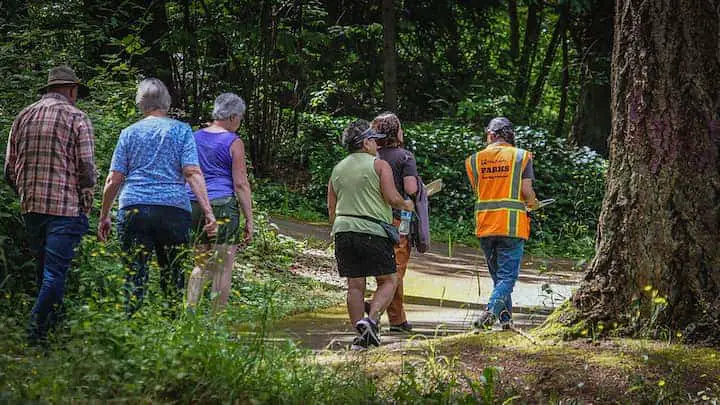
a. Strengthening interpersonal relationships
Enjoying the outdoors together can help strengthen interpersonal relationships by fostering shared experiences, open communication, and mutual understanding. A study published in the Journal of Leisure Research found that couples who participated in outdoor activities reported higher levels of satisfaction in their relationships and improved communication and emotional bonding.
b. Building a sense of community
Participating in outdoor activities with others can create a sense of community and belonging as you work together towards common goals and share a connection with nature. A study published in the Journal of Environmental Psychology found that people who engage in group-based outdoor activities tend to have stronger social ties and a greater sense of community.
c. Encouraging teamwork and cooperation
Outdoor activities often involve collaboration and cooperation, helping to develop valuable interpersonal skills such as communication, problem-solving, and empathy. A study in the Journal of Adventure Education and Outdoor Learning found that group-based outdoor activities can foster cooperative behaviors and improve social skills, contributing to healthier social interactions and relationships.
Environmental Awareness and Sustainability
a. Fostering a connection to the natural world
Spending time in nature helps build a solid connection to the natural world, which can lead to increased environmental awareness and concern. A study published in the Journal of Environmental Education found that individuals who spend more time in nature are more likely to express pro-environmental attitudes and behaviors, such as supporting conservation efforts and engaging in sustainable practices.
b. Promoting conservation and eco-friendly behaviors
Experiencing the beauty and fragility of nature firsthand can inspire a desire to protect and preserve it for future generations. Research published in the Journal of Outdoor Recreation and Tourism suggests that time spent in nature can lead to increased engagement in conservation initiatives and adopting more sustainable habits, such as recycling and reducing energy consumption.
c. Understanding the impact of human activities on the environment
Spending time in nature can increase awareness of the effects of human activities on the environment. A study in the Journal of Environmental Studies and Sciences found that individuals who frequently engage in outdoor activities are more likely to recognize the consequences of their actions on the environment and adopt more sustainable practices in their daily lives.
Nature as an Educational Tool

a. Enhancing children’s learning and development
Outdoor education and experiential learning can positively impact children’s cognitive, social, and emotional development. A study published in Frontiers in Psychology found that children who participated in nature-based learning activities displayed improved attention, memory, and problem-solving skills compared to those who learned in traditional classroom settings.
b. Developing problem-solving and critical thinking skills
Outdoor learning experiences can help develop problem-solving and critical thinking skills by presenting children with real-world challenges that require creative solutions. A study in the Journal of Adventure Education and Outdoor Learning found that students who participated in outdoor education programs demonstrated significant improvements in problem-solving, decision-making, and critical thinking abilities.
c. Fostering curiosity and a lifelong love for learning
Spending time in nature can spark curiosity and promote a lifelong love for learning. Research published in the Journal of Environmental Education suggests that nature-based learning experiences can increase children’s interest in science, technology, engineering, and mathematics (STEM) subjects and foster a sense of wonder and curiosity about the natural world.
Challenges or Excuses That Stop You to Spend Time in Nature
Here’s a summarized version of all challenges mentioned below, along with the potential solutions:
| Barrier | Potential Solution |
|---|---|
| Lack of time | Start small by taking a short walk outside during your lunch break or scheduling nature time into your calendar. |
| Lack of access to natural spaces | Look for local nature preserves, botanical gardens, or wildlife refuges. Explore your neighborhood to find hidden pockets of green space. |
| Concerns about safety | Go with a friend or join a local outdoor group. Tell someone where you’re going and when you’ll be back. Research ahead of time to find safe and well-traveled trails or parks. |
| Lack of motivation | Find a fun outdoor activity or set a goal for yourself. |
| Bad weather | Invest in appropriate gear and plan outdoor activities suitable for the season. |
| Technology | Leave your phone at home or in airplane mode during outdoor activities. Use technology to enhance your nature experiences, like downloading a birdwatching or stargazing app. |
| Physical limitations | Look for nature spaces that are accessible and try outdoor activities more accommodating to your physical abilities. |
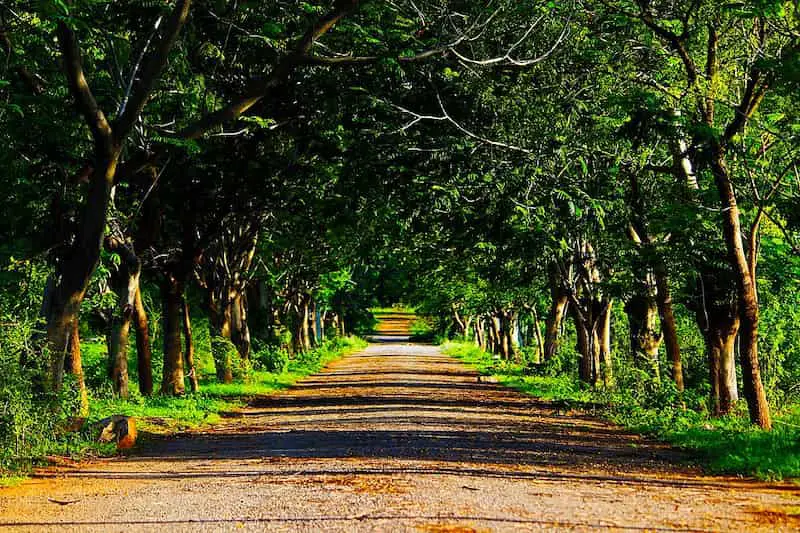
Challenge 1:
Lack of Time It’s easy to feel like we don’t have enough time in the day to do everything we need to do, let alone take a break to spend time in nature. But carving out a little time for nature can significantly impact our mood and stress levels.
Potential solution: Start small! Take a 10-minute walk outside during your lunch break, or wake up 15 minutes earlier to enjoy your coffee outside. Like any other appointment or task, you can also try scheduling nature time into your calendar.
Challenge 2:
Lack of Access to Natural Spaces Not everyone lives near a park or forest, and even if you do, it can be challenging to find natural spaces that are safe and accessible.
Potential solution: Look for local nature preserves, botanical gardens, or wildlife refuges. You can also try exploring your neighborhood and finding hidden pockets of green space, like a community garden or a tree-lined street. Ask friends or family members for recommendations if you are unsure where to start.
Challenge 3:
Concerns About Safety Feeling unsafe can be a significant barrier to enjoying nature, especially for women and marginalized communities.
Potential solution: Try going with a friend or joining a local outdoor group, like a hiking club or birdwatching society. If you’re going alone, tell someone where you’re going and when you’ll be back. You can also research ahead of time to find safe and well-traveled trails or parks. Gain some info about smells that attract bears so that you don’t attract them accidentally and smells that repel mosquitoes to spend time in nature without worrying about bites.
Challenge 4:
Lack of Motivation Let’s face it, sometimes it can be hard to muster up the energy to go outside, especially if we’re feeling stressed or overwhelmed.
Potential solution: Find a fun outdoor activity, like having a picnic, playing frisbee, or going on a scavenger hunt. You can also try setting a goal for yourself, like walking several steps or trying a new trail each week.
Challenge 5:
Bad weather can significantly deter outdoor spending, whether too hot, cold, or rainy.
Potential solution: Invest in the appropriate gear, like a rain jacket or insulated boots, to ensure you stay comfortable no matter the weather. You can also plan outdoor activities suitable for the season, like snowshoeing in the winter or swimming in the summer.
Challenge 6:
Technology Our phones and other devices can be significant distractions that prevent us from fully immersing ourselves in nature.
Potential solution: Leave your phone at home or airplane mode during outdoor activities. You can also use technology to enhance your nature experiences, like downloading a birdwatching or stargazing app to identify constellations.
Challenge 7:
Physical Limitations Physical limitations like disabilities or injuries can make it challenging to navigate outdoor spaces.
Potential solution: Look for nature spaces that are accessible, like paved trails or wheelchair-friendly parks. You can also try outdoor activities more accommodating to your physical abilities, like birdwatching or gardening.
Tips For Spending Time in Nature (Get The Best Experience)

As someone who deeply appreciates the time spent in nature and genuinely wants to share its joy and benefits, I’ve compiled a list of friendly tips to help you make the most of your outdoor adventures. These suggestions will inspire you to embrace the beauty of nature and create lasting memories with your loved ones.
- Start small and local: You don’t need to venture far to experience the wonders of nature. Begin by exploring your neighborhood’s provincial parks, gardens, or nature trails. As you become more comfortable, gradually increase the distance and difficulty of your outdoor activities.
- Make it a family affair: Spending time in nature is an excellent opportunity to bond with your family and friends. Plan a picnic, hike, or try a new outdoor activity together, like geocaching or bird-watching. This shared experience will create lasting memories and strengthen your connections.
- Dress appropriately: Dressing for the weather and wearing comfortable shoes can make all the difference in your outdoor experience. Check the weather forecast before heading out, and dress in layers to adjust quickly to changing conditions. If you’re planning to get a tent, then you must check out the ways to cool the tent so that you don’t end up in heavy sweat that can ruin your experience, and if it’s winter, then know how to warm the tent so that it protects you from freezing out.
- Embrace mindfulness: In nature, be fully present and mindful of your surroundings. Take a moment to close your eyes, breathe in the fresh air, and listen to the sounds around you. This practice can help you feel more connected to the natural world and enhance your overall well-being.
- Bring a camera or journal: Capture the beauty and inspiration in nature by taking photos or writing in a journal. Documenting your experiences can help you appreciate the small wonders of the outdoors and encourage you to return to your heart more often. Plus, you’ll have a beautiful record of your adventures to look back on and share with others.
- Prioritize safety: Familiarize yourself with the safety guidelines for any outdoor activity you plan to engage in, and always let someone know your whereabouts before heading out. Carry a basic first-aid kit, stay on designated trails, and respect wildlife to ensure a safe and enjoyable experience.
- Schedule regular nature time: Prioritize spending time in nature by setting aside normal time. This could mean a weekly hike, a daily walk in the park, or even just a few minutes each day to sit quietly in your garden or on your balcony.
- Join a group or club: If you want companionship or motivation, consider joining a local outdoor group or club. You’ll meet like-minded individuals who share your passion for nature, and you may even discover new activities and destinations to explore together.
- Learn something new: Take your nature experience to the next level by learning about the plants, animals, and natural history of the areas you explore. Bring a field guide or use a mobile app to identify species and deepen your appreciation of the natural world.
- Leave no trace: Lastly, always practice the “Leave No Trace” principles when spending time in nature. This means packing out trash, staying on designated trails, and respecting wildlife and their habitats. Doing so will help preserve the beauty and integrity of the natural spaces you enjoy for future generations.
By following these friendly tips, you’ll experience the many benefits of spending time in nature and creating lasting memories that will enrich your life. Embrace the great outdoors with an open heart and a sense of adventure, and you’ll be amazed by its positive impact on your physical, mental, and emotional well-being. So go ahead, put on your walking shoes, step outside, and discover nature’s wonders.
How Can Technology Help Improve Outdoor Time?
Of course, using technology in moderation without detracting from our natural experiences is essential. We don’t want to be so focused on our phones or devices that we miss out on the beauty and serenity of the natural world. However, when used appropriately, technology can be a valuable tool for enhancing our outdoor experiences and helping us connect with nature in new and exciting ways.
- Identifying Plants and Animals: Mobile apps like iNaturalist or PlantSnap can help us identify the flora and fauna we encounter on our outdoor adventures. These apps use image recognition technology to identify plants and animals based on photos we take with our phones.
- Tracking Physical Activity: Fitness tracking apps like Strava or MapMyHike can help us track our physical activity outdoors, including distance, speed, and elevation. This can be a great way to set goals and measure our progress.
- Sharing Outdoor Experiences: Social media platforms like Instagram or Facebook can be a great way to share our outdoor experiences with others. Sharing photos and stories from our adventures can help inspire others to get outside and connect with nature.
Conclusion
Spending time in nature offers many physical, mental, social, environmental, and educational benefits. The great outdoors has much to offer, from improving cardiovascular health, boosting immune function, enhancing mood, and fostering solid interpersonal relationships. By understanding the science-backed benefits of being in nature, we can make informed choices to prioritize outdoor experiences for ourselves and future generations. So, step outside, breathe in the fresh air, and reap the rewards of spending time in nature with your family and friends.
References
Below is a list of scientific publications and scholarly sources cited throughout this guide. These resources provide further insight into the various benefits of spending time in nature:
- Journal of Environmental Research
- Journal of Clinical Endocrinology & Metabolism
- American Chemical Society’s Journal
- Proceedings of the National Academy of Sciences
- International Journal of Environmental Research and Public Health
- Journal of Environmental Psychology
- PLOS ONE
- Frontiers in Psychology

Michael is heavily inclined towards traveling to natural places and documenting cultures/people from different parts of the world. He also loves hiking and camping and is spirited toward all outdoor activities. He will share his passion for outdoor life and brands or products we use outside our homes. He has good research skills, and that’s why you can see why his articles are packed with info that is factual and not readily available. He also has the vision to travel the whole world and share it with all readers of Outdoor Favor.

